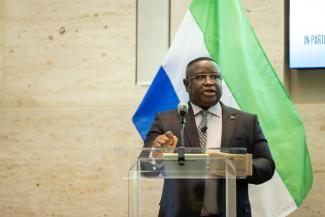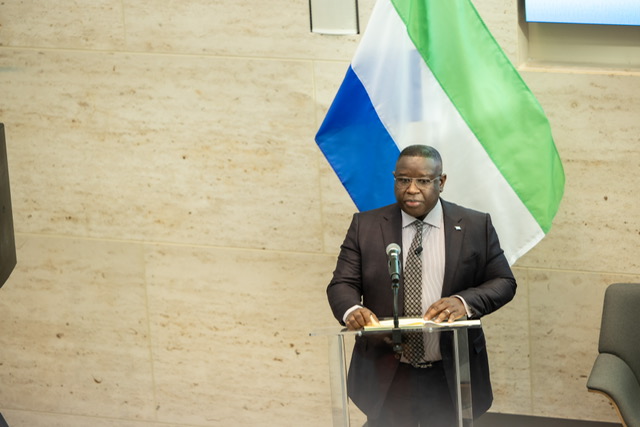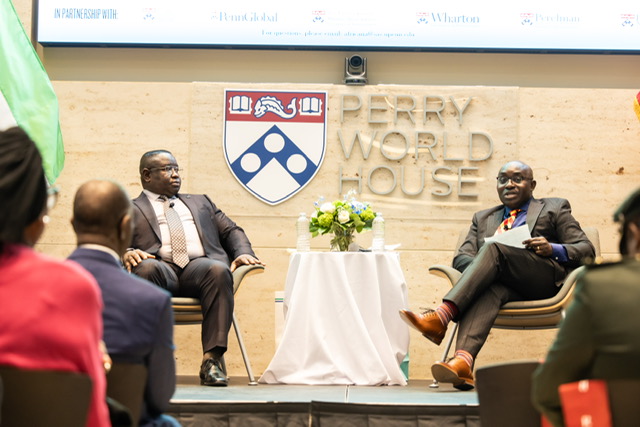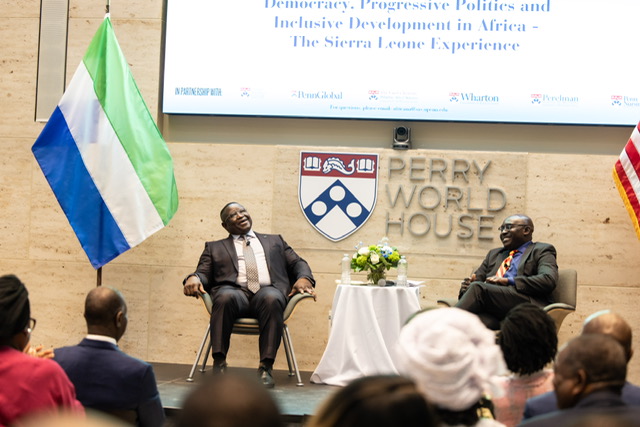
We have to provide education for our people in Africa
– President Julius Bio of Sierra Leone at the CFAS 3rd Annual Distinguished Lecture in African Studies

(All Photo Credits: Eddy Marenco)
President Julius Bio of Sierra Leone delivered the Third Annual Distinguished Lecture in African Studies, organized by the Centre for Africana Studies, University of Pennsylvania, Philadelphia, United States on March 25, 2024. His lecture was entitled, “Navigating the Future: Democracy, Progressive Politics and Inclusive Development in Africa - The Sierra Leone Experience.” After the lecture, he sat down for Q&A with Wale Adebanwi, the Director of the Centre, and President Penn Compact Professor of Africana Studies. Excerpts:
Wale Adebanwi: You are the chair of the AU committee of 10 heads of state and government on the reform of the UN Security Council, and you spoke to that. Let me play the Devil’s advocate: Why do you need to reform the UN Security Council, and what would Africa gain from such reform?
PJB: I think the UN Security is obsolete; completely obsolete but also dysfunctional. And instead of helping us deal with the global challenges we have, I believe it is compounding the challenges that we have. So, it is not just for Africa, but it’s an appeal to the world so we can have a better society. The Charter itself is about peace, and from the drama we’ve seen at the UN Security Council, until and unless there are serious reforms, the world will find itself in serious challenges that it cannot easily navigate.
WA: In recent years, eight successful military coups have replaced democratic governments in West and Central Africa. As a former military ruler yourself, I have two questions about this. The first is that you handed over power within three months, and I am wondering how you accomplished this. Coming from a country where there have been many coups, I know how difficult it is to get the military out of power. So, I was wondering how you were able to relinquish power within three months. I would love you to speak to that. The second part of the question is, what do you think can be done not only to restore democratic rule in these countries that have experienced coups in recent times but also to prevent military takeover in the rest of the continent?
PJB: Dealing with the first part, I believe in democracy as I’ve stated already. Our intervention was meant to bring about democracy after nearly three decades of autocracy in Siera Leone, a one-party rule. So, in the first place, we intervened because all democratic means to change the government had failed. In fact, one-party system was in place. So, the only way to get rid of it was through unconstitutional means. How did I get to hand-over power in three months? Because of my value system. I took over with the explicit understanding that I was not going to spend more than three months. My word is my bond. I took over because I did not want the prolongation of our regime, and I did not see myself extending beyond that point. We faced serious challenges at the time because once I made the pronouncement, the rebels that we had been fighting for nearly six to seven years accepted a peace deal. But the provision that I would stay in power. But I had already committed to the people of Sierra Leone, and it would have been against my value system to continue. So many people saw it as difficult, but I didn’t see it as difficult. Yes, it was a dangerous move because there were a number of colleagues in the military who did not support it. But leadership is important with all that is happening today. If the world is in turmoil or distracted, it is because the world's lack of leadership. Leadership is not when things are normal; you show leadership when things are tough, and you take the people out of very difficult circumstances. The leadership I provided at that time was to make sure that we kept our word. I said I would not be there for more than three months. So even when the rebels said “no, if you stayed longer, we would not fight,” I said “no, I have said three months, and come three months, I am going to go.” That was how I did it.
For the military governments, these are quite different. You remember that in the early 1990s, the Soviet Union had just collapsed, and we were a non-aligned state. We were not specifically supported by any of the world powers, but we had a situation of serious corruption, mismanagement of the economy, and, of course, there was no democracy. These were what spurred us. Today what has inspired these other coups cannot be exactly established, and it varies from country to country. Therefore, it is difficult to lump things together and provide a solution for them. I think we have to deal with them individually and again some of those, or some of us in leadership who are supposed to protect democracy, are the ones actually betraying the cause of democracy. When you tinker with the Constitution using the majority but you know you’re tinkering with the Constitution…. It is democratic because the majority carries the vote. But you know that, in principle, it is not so. When the military sees this, and they know that you are manipulating the Constitution, this encourages them to come in. In fact, even the opposition will encourage the military to go there. So, most of the coups that take place are actually supported by the civilians or encouraged because they know that the preparation of a particular administration will not favour them coming to power through the ballot box. Therefore, they will encourage the military so that they would one day put pressure for an election be held, and they will have a clean slate.

WA: In your first term, you focused a lot on education and gender equality. I am wondering how successful you were with these two policies and what your priorities are for your second term.
PJB: Education, to me, is an existential phenomenon. In the world that we live in today, education is an imperative, and it’s not just ordinary education but education fit for purpose. In Africa, we have to make sure we catch up with the rest of the world, and to make sure that we do that, we have to educate our population. We have to bring ourselves up in terms of knowledge and skills. What we did was to make sure that access was free for every Sierra Leonean. Every child born in Sierra Leone has access to primary and secondary education at the cost of the government. Women who take STEM courses can continue up to university for free. And for the many things we do, we do not just provide free access to education; we’ve been working on the quality of education. We have also provided for kids with poor parents, for the parents to be able to send their kids to school. We provide transportation. We also provide school meals and feeding programs to ensure that kids don’t go to school hungry. We also provide them with core textbooks.
In our society, there is poverty, and some parents cannot provide core textbooks for their kids. So we are providing core textbooks and learning materials, too. It’s a combination of a whole host of things, and all of these were happening against the backdrop of many international crises, including COVID. Still, we kept our focus on making sure that nothing derailed us on this track of education. The UN Security Council recognized us. I was part of the high-level steering team of UNESCO. I am a champion in the world for foundational education. Besides learning outcomes, we have greatly improved in Sierra Leone, and the numbers from secondary schools to universities have improved, as well as the quality of the results. In five years, we have received accolades from around the world, and we did it despite the financial constraints and the international crisis that provided a very tough headwind for us. We can’t confidently say that we achieved quite a lot, but it’s a long process. We have only started, and we are continuing to make sure that we improve on the quality, to make sure that every child gets basic and secondary education and to make sure that they can transition to the university.
For women’s empowerment, I always tell my personal story as the last son of a woman – may her soul rest in peace. She had no education, and my father died when I was only four. I started school, I didn’t know what to do, nor did my mom know what to do. But she valued education, and through her support and that of my elder sister later on – she also just passed about a month ago, may her soul rest in peace – I am where I am today because of education. I come from a little village, 100 miles away from the city. With the support of these two women, I was able to get to this point. I have a strong belief that women have been neglected and that we should bring them to par with their male folks. We will accelerate the rate of development in the world if we have empowered women as we have done for the male. I have a couple of male teachers, but I normally say that I am a product of women. This is why I believe it is not politics; I believe that we should empower them if we are talking about development. We pay lip service to development around the world if we do not take the women folk along. They have a different take on how we see things, and that take is important. Therefore, I did not just pay service to that; we have moved an act through parliament called gender empowerment, which has given at least in Sierra Leone 30% in all appointed positions, both in the private sector and government, and many other opportunities they lacked at the time. Hence, women by legislation now constitute more than 30% of our legislature, cabinet minister, and every other positions. We are now in the process of implementation, just to make sure we bring them along.
You asked what I am doing this time around. I have realized that as we are in the middle of all this education and many things that we did to change the landscape and the narrative of Sierra Leone, we have this situation in Ukraine. We have been suffering ever since. Food prices went up, and we have arable land, and what we have decided to do is to, in addition to political independence, have food sovereignty. Therefore, we have designed a program called “Feed Sierra Leone.” We want to be able to produce most of our food within the country, and we are just at the cusp of actually implementing that. We are raising the necessary funds to put the policies and everything else in place to embark successfully on that.
WA: Your main challenger in the June 2023 presidential election, the candidate of the APC, rejected the results and stated that they were not credible. The EU observers also stated that the lack of transparency by the Electoral Authority led to mistrust, and there were also allegations of violence. How would you react to the criticisms and allegations regarding the conduct of elections in which you were declared the winner?
PJB: It is only because I didn’t want to waste time, I would have called for a repeat of the election. Because I know I can beat this man, hands down anytime. Remember, I beat him in 2018, and with what we have done to change the narrative of Sierra Leone, we have reduced the maternal mortality rate by 61%. We have come back to the world’s stage to be elected by 198 nations around the world to go back to the UN Security Council in a non-permanent category. With all of these, taking all the kids back to school, it is extremely difficult for an opponent that had no message and did not campaign to claim that he can win. Normally losers don’t accept.
WA: You once told an interviewer in 2011, and I quote you, “I am one of the 35 children of paramount chief Charie Von Bio; in fact, I am the 33rd child; that is not the greatest start in life.” You have not done badly, Mr President. So, to what else would you attribute your success apart from the two women?
PJB: I believe in God. I truly believe that besides those two people, what God has willed, no man shall alter. Whatever has been imparted to me, my path to where I am today has been mostly crafted and destined by God. I am also a hard worker. But I truly believe that there are more hardworking people than me, so sometimes I look at the journey and I said “no, I didn’t do this alone.” My mom was not there to take exams for me, and my sister was not there to take exams for me, they would only encourage me, so I think I will give the greater share to God.
WA: Finally, the actor, Edris Elba, is perhaps the biggest celebrity form Sierra Leone. How proud are you of him? I am wondering about your relationship. He was once described as the sexiest man alive in about 2018. I wonder how it feels to be the President of a man who is described as such.
PJB: I feel sexy when I am around him. He was in Sierra Leone about a month ago, and what I admire about him is that he loves his country and wants to give back to society. So, he is working on a project that will help poor people. He realized I was very interested as I had described my path as miraculous. I want to give the same opportunity, especially to the poor and families who cannot make it in life. And he believes in that, too. He is working on the project, and that is what I love most about him. He is a great guy.

WA: You were writing a doctoral dissertation when you decided to go to run for office. You’ll be around 65 at the end of your second term. Are you returning to the dissertation?
PJB: I think I have a PhD now! I still have a few chapters to write, if they permit me. I don’t think my daughter will permit me again to leave her at home and go to school. But let me go back to those two women I spoke about. They told me never to stop trying, to be resilience and also try to work hard every day of my life. That is what kept me going. Nothing stops me. So, you have to keep going every day. The world is tough. The world is competitive. So, even for us, I tell my colleagues that we are becoming obsolete in terms of what we know today. The kids are better. They are native technologists; they know the phones we use more than we do. We only call, but they can use all the applications there. As I would say to every young man, what kept me going was that “we have to work hard.” We in Africa are considered to be lazy people but we are not lazy, so we must change that mentality. We must work hard because hard work pays. The only thing I know of my mom is that she woke up and said “my focus is this today” and she will go into it. So, also was my elder sister, and I was able to learn from them, and that kept me going. It is a great virtue.
- Transcribed by Chukwudi M. Isiani, doctoral student, Department of Africana Studies, University of Pennsylvania.
